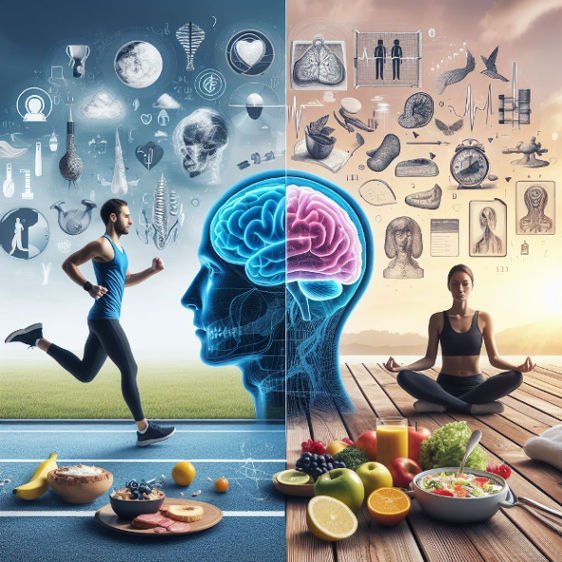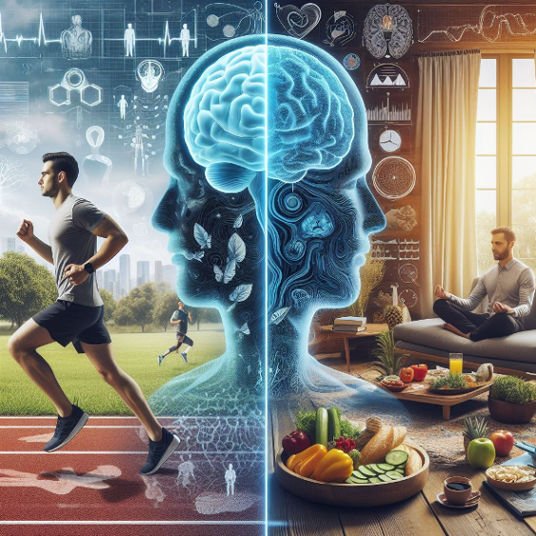When you hear the word “health”, what comes to mind? The majority of us immediately associate physical health with things like eating well, exercising, drinking water, etc. Achieving a healthy and happy lifestyle also requires maintaining our mental health, even as physical health is crucial for keeping our bodies in good form and operating as intended.
The idea that the mind and body are two distinct creatures and that they frequently need to cooperate for our well-being leads to a common misconception about the relationship between mental and physical health. Our physical and mental well-being are directly correlated.
In this article, we will discuss Mental Health vs. Physical Health
The Impact of Mental Health on Physical Health
Mental health issues affect about 1 in 5 Americans. Bad thoughts, low energy, mood or behavior changes, feeling lonely, difficulty managing stress, altered eating or sleeping habits, negative self-talk, and sadness or depression are all signs of poor mental health.
It does not imply that you have a mental disease if you experience any of the symptoms above. When symptoms of poor mental health become persistent and interfere with your capacity to carry out daily activities physically, it is considered a mental health issue, often known as mental illness. Among the prevalent mental diseases are:
- Depression and Anxiety
- Psychosis
- PTSD
- ADD
- Disorders of Eating
- Addiction to Bipolar Depression
What impact, then, does mental health have on physical health? Its name does not deceive you. Your mental health can affect not just your thinking, but also your behavior and physical health. Your body’s capacity to make healthy decisions will not only be impacted by poor mental health, but it can also raise your chance of developing long-term conditions like heart disease and other health issues like obesity, a compromised immune system, and more.
Research indicates that individuals with depression exhibit physiological alterations, potentially leading to detrimental effects on their physical well-being. Among these modifications are:
- An upsurge in inflammation
- persistent exhaustion
- Changes in controlling heart rate and blood circulation
- Hormone abnormalities related to stress
- Lack of sleep
Metabolic abnormalities, like those observed in those at risk for diabetes, can be attributed to poor mental health. While low mental health can deplete your energy and keep you from addressing your physical health, improving your physical health and activity level can also help your mental health.

“Mental health and mental illness affect almost every family, but stigma still causes so much shame, fear, doubt, isolation, and misunderstanding. People avoid receiving care that is so much needed and merited because of the humiliation that stigma causes.”
The Impact of Your Physical Health on Your Mental Health
The condition and functionality of your physical body are referred to as your physical health. There are four primary types of physical health maintenance strategies.
A healthy lifestyle includes getting enough sleep, drinking water, and being active throughout the day.
Diet: Consuming healthful, well-balanced meals
Hygiene: Maintaining personal cleanliness and upkeep of your surroundings is known as hygiene.
Work out: make use of and build up your muscles and physique
Improving your physical well-being and fitness can prolong your life, elevate your mood, and prevent mental disorders. Healthy and active individuals have better sleep, feel calmer and invigorated during the day, and have more optimistic outlooks on life and themselves.
Leading a healthy lifestyle and engaging in regular physical activity can prevent chronic diseases and ailments such as type 2 diabetes, anxiety, depression, heart disease, cancer, and dementia.
Exercise on its own is an effective treatment for many common mental health issues. Research indicates that it can lessen the symptoms of ADHD, manage anxiety, and treat mild to moderate depression just as well as antidepressants. This is because physical activity causes the brain to undergo several changes, such as the creation of new neurons, a decrease in inflammation, and activity patterns that enhance emotions of peace and well-being. Additionally, it releases dopamine and serotonin, two endorphins that improve your mood and reduce stress.
Which Has Greater Significance?

That being said, which is more crucial—physical or mental? Although there is a complex relationship between mental and physical health, the short answer is that for your body to work correctly and for you to lead a happy and healthy life, it needs both mental and physical health. If you are struggling in one area, you may opt to prioritize one over the other, and that is fine. Just be mindful of the impact they have on one another and the significance of maintaining your physical and mental well-being.
Searching for strategies to prevent stress and anxiety while maintaining your health?
It’s okay to seek support if you or someone you know is experiencing mental health difficulties. Kindly get in touch with a mental health specialist. If you are not comfortable speaking with a professional, start by contacting a close coworker, family member, or friend.
Ways to Maintain Your Physical and Mental Well-Being

If you want to improve your overall well-being, you must care for both your physical and mental health.
Here are some strategies for looking after your physical and emotional health:
Participate in regular exercise. Exercise is essential for staying physically fit, but it can also enhance your attitude. Walking for 10 minutes each day can improve your mental awareness, which will make you feel happier and more energized.
Consume a healthy diet. Eating a diet rich in fruits and vegetables and low in processed sugars or fat can enhance your physical and mental well-being. To assist you in developing a food plan that is specific to your needs, think about consulting with a licensed nutritionist.
Steer clear of drugs and alcohol. Smoking and drinking can have a detrimental impact on your physical and emotional health, even though they may temporarily make you feel better.
Make time to sleep. Adults need between seven and nine hours of sleep per night to feel well. To feel more awake during the day, you can also take a 30-minute sleep.
Attempt some relaxation methods. When you’re stressed, you can benefit from meditation, deep breathing, and focusing your thoughts.
Establish healthy mental habits. Attempt to focus on good emotions and events rather than negative ones.
Ask for assistance from others. Having a conversation with friends or relatives can reduce stress. Getting others to assist you in difficult times might also alleviate the load you feel.
FAQs
How is mental health different from physical health?
In contrast to other physical ailments, mental illnesses begin in the brain. Though our bodies’ least understood organ, the brain is subject to injury, healing, and changes based on events throughout life, much like any other organ. Mental health issues may affect the rest of your body.
Which is better for your mental or physical health?
Which one is more important? That being said, which is more crucial—physical or mental? Although there is a complex relationship between mental and physical health, the short answer is that for your body to work correctly and for you to lead a happy and healthy life, it needs both mental and physical health.
What is the difference between mental health and health?
Mental health, like physical health, is a necessary part of everyone’s existence. In contrast to mental health, which is concerned with your ideas, feelings, and emotions, physical health is the condition of your body.
What are 3 reasons why mental health is important?
Having good mental health facilitates your ability to manage life’s stresses.
Maintain good physical health.
- Maintain good relationships.
- Contribute significantly to your community.
- Put out constructive effort.
- Reach your greatest potential.
Summary
It emphasizes that maintaining physical health through lifestyle choices like diet, exercise, hygiene, and adequate sleep can have a positive impact on mental well-being. Conversely, poor mental health can lead to physical health issues and increase the risk of chronic diseases.
Regular physical activity effectively treats common mental health issues like ADHD, anxiety, and depression. It’s important to recognize signs of poor mental health and seek help when needed to prevent long-term physical and mental health problems.

I’m a seasoned content creator with 6+ years of experience crafting engaging, SEO-optimized content that drives traffic and rankings. I excel in keyword research, link building, and guest posting, ensuring your brand reaches new heights.

